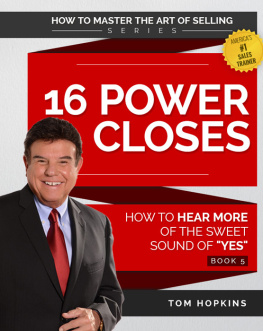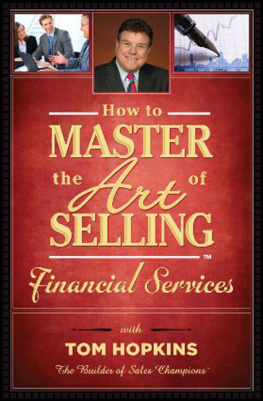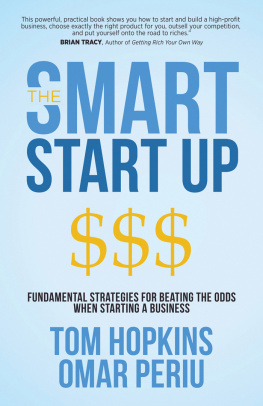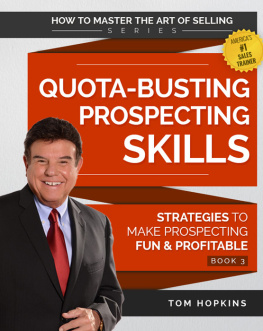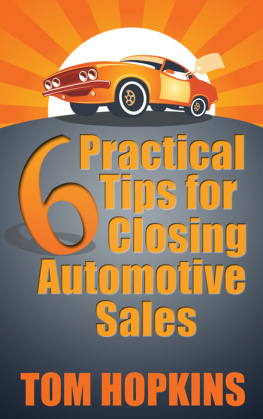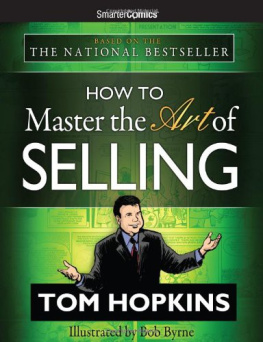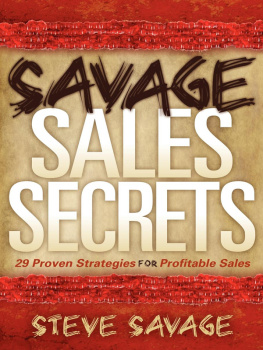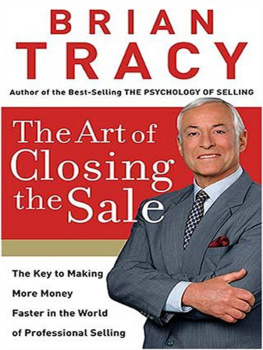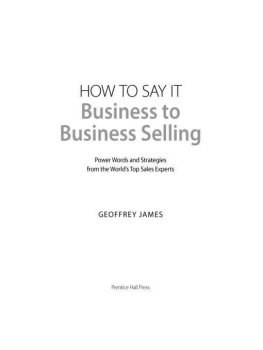16 Power Closes
How to Hear More of the Sweet Sound of "YES"
How to Master the Art of Selling Series
Book 5
By Tom Hopkins
Thank you for buying this eBook,
published by Made For Success Publishing
To learn more about Made For Success Publishing you can visit us at:
www.MadeForSuccessPublishing.com
P.O. Box 1775
Issaquah, WA 98027
Copyright 2015
All rights reserved.
In accordance with the U.S. Copyright Act of 1976, the scanning, uploading, and electronic sharing of any part of this book without the permission of the publisher constitutes unlawful piracy and theft of the authors intellectual property. If you would like to use material from the book (other than for review purposes), prior written permission must be obtained by contacting the publisher at Thank you for your support of the authors rights.
Distributed by Made For Success Publishing
Cover Design and eBook Conversion by DeeDee Heathman
For ordering information, please contact Made For Success +14256570300
Hopkins, Tom
16 Power Closes: How to Hear More of the Sweet Sound of "YES"
ISBN: 978-1-61339-777-0
1. BUSINESS & ECONOMICS / Sales & Selling / General
2. BUSINESS & ECONOMICS / Marketing / General
3. BUSINESS & ECONOMICS / Training
CHAPTER 1
Most new or average salespeople have a dream. In the dream, they meet smiling, happy people. They build rapport, qualify, and give a dynamic presentation. At the end of the presentation, the smiling folks cant wait to own the product. They claps their hands. They whip out their checkbooks or credit cards, sign on the dotted line, and shake hands profusely with the salesperson for showing them the greatest thing since sliced bread. Yep, thats a dream all right.
Let me give you a short lesson that will take you far in sales. If the people youre talking with dont object to anything during your time together, theyre either not listening or not qualified. In other words, they wont buy!
Objections (concerns) are nothing more than ways for your potential client to slow things downto keep themselves from making rash decisionsfrom feeling as if theyre being sold. Objections are a common aspect of every sale youll attempt to make. Accept this fact and youll open your mind to the ways to handle, address, and overcome objections that Ill cover in this chapter.
Until you learn how to handle objections, youre not going to approach your potential in sales. Champions have an affection for even the peskiest objection because its something concrete. They know theyve reached the Klondike and are digging for gold when they start hearing objections.
Make the Handling of Objections an Integral and Expected Part of Your Selling Sequence
I hope that youll highlight this achievement-oriented statement:
Objections are the rungs of the ladder to sales success.
When you climb to the top of that ladder, they own what youre selling. There just isnt any other way to where you want to climb except by grasping and overcoming the most common concerns. If you decide to overcome objections by learning the material in this book, youll learn to love objections as much as I dobecause they announce buying intention and point the way to closing the sale.
What Is an Objection?
Objections are statements by potential clients that they want to know more. Of course, objections dont usually come out sounding like a polite request for additional information. People arent trying to make it quite that easy for you. They usually are sincerely objectingthey dont realize theyre just asking for more information. Its your job to know that, and to know what to do about it.
There are two kinds of objections, minor and major. Please keep this in mind at all times:
Minor objections are defense mechanisms.
People use them to slow things down. They dont mean that they dont want to buy; they just want to mull things over before committing themselves. Maybe they need clarification on something. Perhaps theyve thought of a need they forgot to tell you about. It doesnt matter the reason. Its always a good sign when someone gives you a concern. And you dont necessarily have to address all of them. Trust me. There are people who look at selling situations as opportunities to debate. Theyll toss objections at you all day long if youll allow it.
If you sell frequently to couples, youll have one of them start to go along with your demonstration and then the other one suddenly starts objecting and fighting you. Sometimes the other spouse, the one whos going along, is more surprised than you are. The fighting spouse may only want to catch his or her breath, or make sure that you can answer minor objections eloquently before things get any thicker.
Of course, not all concerns should be overcome. Youll often encounter conditions that prevent the purchase.
Major concerns are things such as: The new SUV doesnt fit in the garage. Your product doesnt come in a color that complements the decorating style of the potential client. In other words, your product has limitations that simply dont fill enough of the needs of the client.
What Is a Condition?
A condition is a valid reason for not going ahead. Its not an objection to overcome, its a total block to the sale that you must accept and walk away from. Champions are quick to recognize conditions. The major aim of qualifying is to determine whether there are any conditions that make the sale impossible and further attempts to sell pointless. So Champions, being expert qualifiers, never destroy their enthusiasm by trying to overcome conditions that cant be overcome.
One of the most common conditions for large purchases, of course, is that the prospects dont have the money and cant qualify for a loan.
Even skilled qualifiers may occasionally be well into their selling sequence and then encounter what appears to be a condition. When this happens, treat it like an objection. That is, try to break it down. If it doesnt break down, its a condition, and youll need to develop the ability to swallow hard and then quickly and courteously disconnect from the prospects who, youve just discovered, cant own.
Some of us have a severe challenge here. If we spend time with people and get into our selling sequence with them, we get emotionally involved to the point where we lose our ability to see the difference between an objection that can be overcome and a condition that cant.
In this, sales is like poker. Professional poker players are quick to throw in a losing hand, no matter how much theyve already bet on it. Average poker players stay in the game and keep on calling bets with hands they know have little chance to win. Instead of accepting a small loss and getting out, they stay in and take a greater loss.
As Reinhold Niebuhr said, Give us serenity to accept what cannot be changed, courage to change what should be changed, and wisdom to distinguish the one from the other. Have the wisdomand sometimes it also takes courageto pleasantly and quickly withdraw from losing situations.
Youll appear more professional for doing so and, hopefully, when conditions change in the future for these people, they can become clients of yours. If nothing else, by being extremely professional you will earn the right to ask them for qualified referrals to friends, associates, or relatives who might not have the same conditions. So, all is not lost. Its just different.
Now let me repeat what an objection is. An objection is a request for more information. Believe me, I wont waste my time objecting to small things unless Im really considering taking the product or serviceIm the same as most buyers on that point. But understand this: Potential buyers who object really cant see how your offering will suit their needs. Your job is to use your superior knowledge of what youre selling to show them how it can satisfy their needs.
Next page
